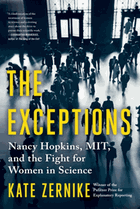
In 1999, the Massachusetts Institute of Technology admitted to discriminating against women on its faculty, forcing institutions across the country to confront a problem they had long ignored: the need for more women at the top levels of science. Written by the journalist who broke the story for The Boston Globe, The Exceptions is the untold story of how sixteen highly accomplished women on the MIT faculty came together to do the work that triggered the historic admission.
The Exceptions centers on the life of Nancy Hopkins, a reluctant feminist who became the leader of the sixteen and a hero to two generations of women in science. Hired to prestigious universities at the dawn of affirmative action efforts in the 1970s, Dr. Hopkins and her peers embarked on their careers believing that discrimination against women was a thing of the past--that science was, at last, a pure meritocracy. For years they explained away the discrimination they experienced as the exception, not the rule. Only when these few women came together after decades of underpayment and the denial of credit, advancement, and equal resources to do their work did they recognize the relentless pattern: women were often marginalized and minimized, especially as they grew older. Meanwhile, men of similar or lesser ability had their career paths paved and widened.The Exceptions is a powerful yet all-too-familiar story that will resonate with all professional women who experience what those at MIT called "21st-century discrimination"--a subtle and stubborn bias, often unconscious but still damaging. As in bestsellers from Hidden Figures to Lab Girl and Code Girls, we are offered a rare glimpse into the world of high-level scientific research and learn about the extraordinary female scientists whose work has been overlooked throughout history, and how these women courageously fought for fair treatment as they struggled to achieve the recognition they rightfully deserve.

